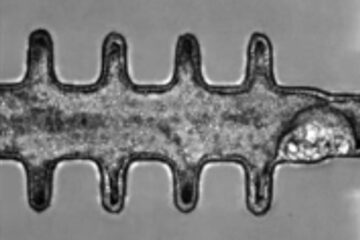Disruption of circadian rhythms may contribute to inflammatory disease

A disruption of circadian rhythms, when combined with a high-fat, high-sugar diet, may contribute to inflammatory bowel disease and other harmful conditions, according to a recent study conducted by researchers at Rush University Medical Center. The study is online at the peer-reviewed, open-access journal, PLOS ONE.
“Circadian rhythms, which impose a 24-hour cycle on our bodies, are different from sleep patterns,” said Robin M. Voigt, PhD, assistant professor at Rush Medical College and first author of the study. “Sleep is a consequence of circadian rhythms,” Voigt said.
While circadian rhythm disruption may be common among some, the research suggests that it may be contributing to a host of diseases that may be prevented by regulating things such as sleep/wake patterns and times of eating to help prevent circadian rhythm disruption. Including prebiotics or probiotics in the diet can also help normalize the effects of circadian rhythm disruption on the intestinal microbiota to reduce the presence of inflammation.
“It's something that needs to be addressed — not something people need to be very concerned about, but aware. If you have some of these other risk factors, like a high-fat, high-sugar diet,” or a genetic tendency toward disruption in circadian rhythms, “take precautions, watch your diet, take pre- and probiotics, monitor your health, be vigilant,” Voigt said.
The prevailing theory is that of a “second hit hypothesis” whereby individuals with at-risk lifestyle choices or genetic predispositions will only develop disease if a secondary insult is present. “We believe that chronic circadian rhythm disruption promotes/exacerbates inflammatory-mediated diseases, at least in part, due to changes in the intestinal microbiota,” she said.
Inflammation is associated with a number of diseases, including cardiovascular disease and cancer, and can cause organ damage and is associated with increased morbidity and mortality.
In the study, male mice had their cycles of exposure to light and dark reversed on a weekly basis (i.e., “shifted”), an experience that is known to disrupt an organism's innate circadian rhythm. Some of the mice ate standard food; others ate a high-fat, high-sugar diet. Researchers found that the microbiota of the mice that had their circadian rhythms disrupted were significantly different from that of the control group — but only if they had consumed the high-fat, high-sugar diet.
All the mice that ate the high-fat, high-sugar diet displayed changes in the makeup of the microorganisms in their guts, regardless of circadian status. However, mice that ate the high-fat, high-sugar diet, and had circadian-rhythm disruptions, had higher concentrations of bacteria that are known to promote inflammation than any of the other mice in the study. Disrupting the circadian rhythms of the mice fed standard chow did not significantly affect the microbiota in their intestines.
These findings support previous studies that have shown that the negative effects of circadian disruption are subtle enough that “a second environmental insult is often necessary to reveal [their] deleterious effects,” the study says.
Many people have their circadian rhythms disrupted on a regular basis — shift workers like nurses, doctors, firefighters and policemen. “Other people have 'social jet lag,' a lifestyle pattern that leads them to maintain a normal schedule on weekdays, but then stay up late and sleep in on the weekends,” Voigt said.
“Looking forward, we would like to functionally evaluate how circadian rhythm disruption may influence diseases including colon cancer, which may in part be the consequence of altered intestinal microbiota,” she concluded.
The study received support from the National Institute on Alcohol Abuse and Alcoholism. The research was conducted at Rush University Medical Center and included work from collaborators from the University of Illinois at Chicago and Northwestern University.
About Rush
Rush is a not-for-profit academic medical center comprising Rush University Medical Center, Rush University, Rush Oak Park Hospital and Rush Health.
Media Contact
All latest news from the category: Health and Medicine
This subject area encompasses research and studies in the field of human medicine.
Among the wide-ranging list of topics covered here are anesthesiology, anatomy, surgery, human genetics, hygiene and environmental medicine, internal medicine, neurology, pharmacology, physiology, urology and dental medicine.
Newest articles

Solving the riddle of the sphingolipids in coronary artery disease
Weill Cornell Medicine investigators have uncovered a way to unleash in blood vessels the protective effects of a type of fat-related molecule known as a sphingolipid, suggesting a promising new…

Rocks with the oldest evidence yet of Earth’s magnetic field
The 3.7 billion-year-old rocks may extend the magnetic field’s age by 200 million years. Geologists at MIT and Oxford University have uncovered ancient rocks in Greenland that bear the oldest…

Mini-colons revolutionize colorectal cancer research
As our battle against cancer rages on, the quest for more sophisticated and realistic models to study tumor development has never been more critical. Until now, research has relied on…





















